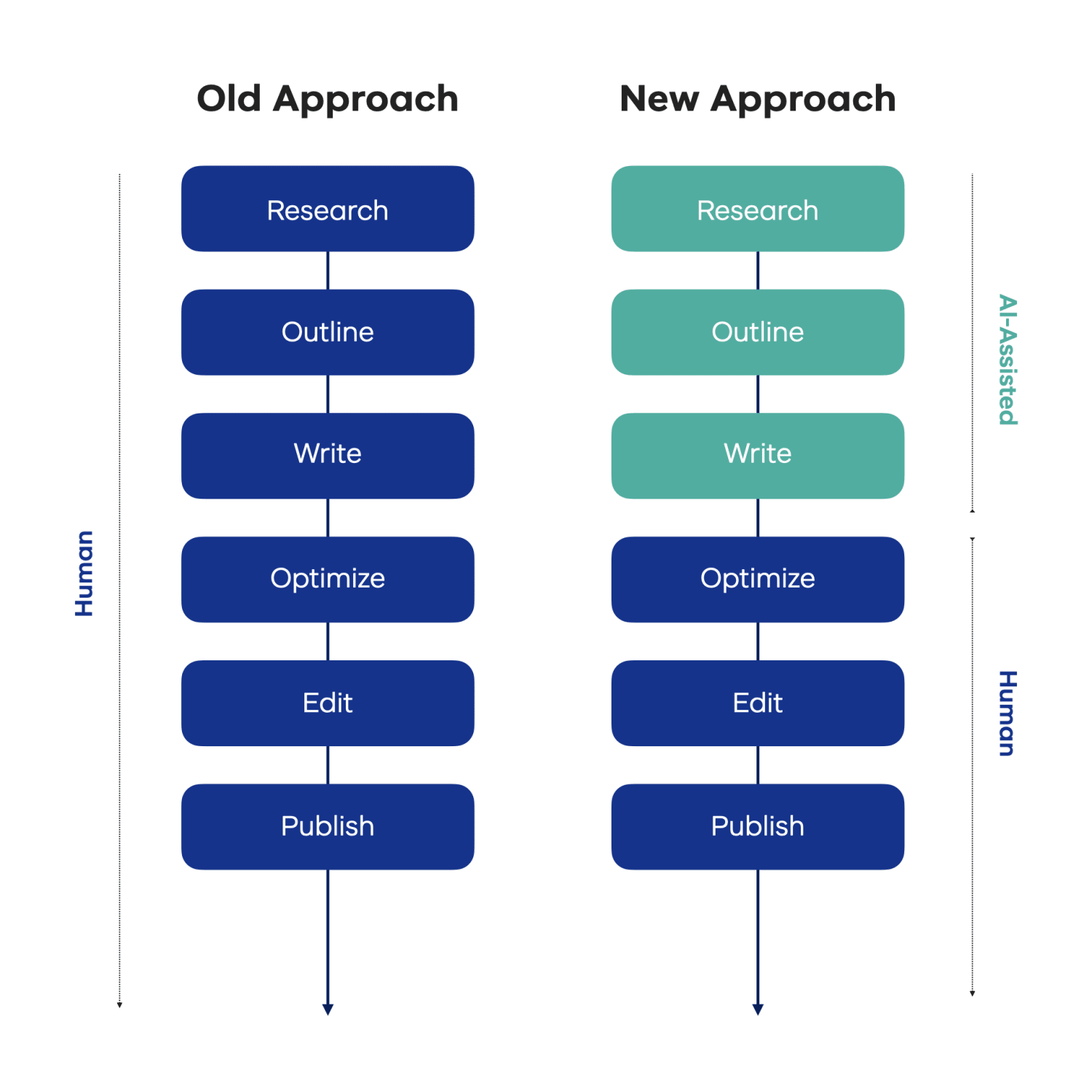The role of content creators is transforming. No longer solely reliant on their ingenuity, they are evolving into content stewards, harnessing the power of generative artificial intelligence (GenAI) to augment their creative processes and supercharge content output. This shift marks a new era in content creation, one where human creativity and artificial intelligence work in synergy. Brands can leverage this powerful combination responsibly to maximize efficiency and reach while maintaining quality, transparency, and consumer trust.
AI-Generated Content For Brands
A guide to responsibly stewarding and scaling content with artificial intelligence.
The Content Stewardship Approach
Content stewardship is the practice of ethically guiding the responsible use of AI content creation through human oversight and optimization. AI use is never meant to eclipse human creativity, but to augment it. Humans provide the strategic direction, creative vision, and critical thinking. At the same time, AI assists with generating initial drafts, optimizing for readability, and adapting content for different platforms. This approach offers several key benefits:
- Strategic Guidance and Inputs: Humans define the overall content strategy, target audience, and critical messages, ensuring the AI aligns with brand objectives.
- Shaping Language for Human Storytelling: While AI can generate text, humans refine the language, tone, and style to ensure it resonates with readers and aligns with the brand voice.
- Removing "Fluff": Humans review AI content to remove excess verbiage and “fluffy” content to ensure the message is clear and direct.
- Fact-Checking and Accuracy: Humans play a crucial role in verifying AI-generated information, ensuring accuracy and preventing the spread of misinformation.
- Mitigating Bias and Hallucinations: Humans review AI-generated content for potential biases or "hallucinations" (factually incorrect or nonsensical outputs), maintaining quality and credibility.

Transparency and Consumer Trust
As more and more brands begin to use AI for content creation, transparency is paramount. Studies show that 75% of consumers want brands to be upfront about using AI in branded content. While 65% won't lose trust if a brand uses AI, this trust is conditional on transparency. Brands can build and maintain trust by taking the following steps:
- Publish a company AI-use public statement or disclosure: Communicate your AI usage policy to your audience, outlining how and why you use AI in content creation.
- Conduct consumer research:
.Understand your specific audience's sentiments about AI usage in your industry. Tailor your transparency strategy accordingly. - Define the level and depth of AI integration: The extent of your AI usage will influence the level of transparency required. Heavier reliance on AI may necessitate more detailed disclosures.
Industry Considerations for AI Adoption
Consumer comfort levels with AI vary significantly across industries. Some sectors are more receptive to AI-generated content, while others remain skeptical due to the potential risks.
AI Use Is Positively Received In:
- Technology: The tech industry is inherently intertwined with AI, making consumers more accepting of its use in content creation.
- Entertainment: AI can enhance creative processes and personalize experiences in entertainment, leading to positive consumer perceptions.
- Shopping/Retail: AI-powered recommendations and personalized marketing are already common in retail, paving the way for greater acceptance of AI-generated content..
- Advertising: AI can optimize ad targeting and personalize messaging, making its use in content creation less controversial.
AI Use Is Concerning In:
- Healthcare: The high stakes and potential for harm if AI-generated content is inaccurate make consumers wary of AI in healthcare.
- Cybersecurity: Trust and accuracy are crucial in cybersecurity, making consumers hesitant about AI involvement in content creation.
- Banking & Finance: The sensitive nature of financial information and the potential for bias make consumers cautious about AI in this sector.
- Automotive: Safety concerns and the complexity of automotive technology contribute to consumer skepticism about AI-generated content.
Optimal Use Cases for AI for Content Creation
Where is AI best applied? Where does it provide the most payoff? Brands that are successfully adopting AI tools to augment and accelerate search and content use it for things like:
- Scale: Automating tasks, streamlining production, and repurposing content to increase output and reach.
- Speed: Generating first drafts quickly, saving content teams valuable time.
- Volume: Producing large quantities of content efficiently, enabling a more robust content strategy.
- Variation: Adapting content for different platforms and personalizing messaging for various target segments.
Product descriptions, social media posts, blog posts, and even long-form articles are examples of content types that benefit from AI assistance.
When to Exercise Caution with AI
While using artificial intelligence for generated content offers numerous benefits, there are situations where its use should be approached with caution:
• Highly regulated industries: Legal or government content requires meticulous accuracy and adherence to strict regulations, making AI less suitable.
• Academic content: Rigorous research and subject matter expertise are essential for academic writing, areas where AI may fall short.
• Technical content: Complex technical information requires precision and accuracy, making human oversight crucial.
• Emotionally sensitive content: Connecting with an audience on an emotional level requires human empathy and understanding, something AI lacks.

Responsible Use of AI: Steps for Brands
Where do brands begin? Here are six steps for adopting and accelerating content creation with AI:
- Understand audience sentiment: Conduct research to gauge your audience's perception of AI-generated content.
- Define AI transparency strategy: Develop a clear policy for disclosing AI usage to maintain consumer trust.
- Choose AI tools that protect data integrity: Select reputable AI platforms prioritizing data security and ethical practices. Our platform, WPP Open, complies with the WPP Data Ethics Policy, Artificial Intelligence Policy, and AI & Data Ethics principles and guidelines.
- Organize brand guidelines: Use your brand’s style guide, brand tone, and brand guidelines to train the AI tool to follow your brand’s specific content style and rules.
- Prioritize content types for AI augmentation: Focus on content areas where AI can deliver the greatest value and efficiency gains.
- Retain human expertise for content stewardship: Human oversight is essential for guiding AI, ensuring accuracy, digital optimization and maintaining brand voice.
By following these steps, brands can effectively integrate AI into their content workflows, maximizing efficiency while upholding ethical standards and maintaining consumer trust. The future of content creation lies in the harmonious partnership between human creativity and artificial intelligence. AI is here to stay. But human creativity will always be a guiding hand to ensure the highest-quality content outputs.
Download The Full Report On AI Stewardship
Content stewardship is the practice of ethically guiding the responsible use of AI content creation through human oversight and optimization. Download this guide to learn about AI content development and how to apply AI responsibly to your content strategy.
Please provide your contact information to continue.
Proyectos afines

Google’s Search Generative Experience

